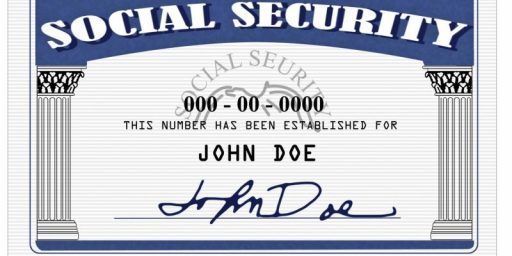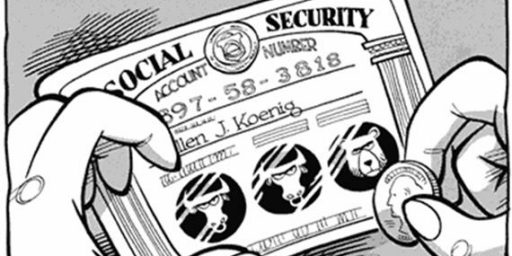Social Security Payouts Exceed Pay-ins
 The Social Security Ponzi scheme* is collapsing sooner than expected:
The Social Security Ponzi scheme* is collapsing sooner than expected:
The bursting of the real estate bubble and the ensuing recession have hurt jobs, home prices and now Social Security.
This year, the system will pay out more in benefits than it receives in payroll taxes, an important threshold it was not expected to cross until at least 2016, according to the Congressional Budget Office.
Stephen C. Goss, chief actuary of the Social Security Administration, said that while the Congressional projection would probably be borne out, the change would have no effect on benefits in 2010 and retirees would keep receiving their checks as usual.
The problem, he said, is that payments have risen more than expected during the downturn, because jobs disappeared and people applied for benefits sooner than they had planned. At the same time, the program’s revenue has fallen sharply, because there are fewer paychecks to tax.
Analysts have long tried to predict the year when Social Security would pay out more than it took in because they view it as a tipping point — the first step of a long, slow march to insolvency, unless Congress strengthens the program’s finances.
“When the level of the trust fund gets to zero, you have to cut benefits,” Alan Greenspan, architect of the plan to rescue the Social Security program the last time it got into trouble, in the early 1980s, said on Wednesday.
This was simply inevitable: Baby Boomers are retiring, retirees are living longer, and there are fewer young workers behind them to pay for them. Despite the myth of a “Trust Fund,” today’s workers are funding today’s retirees. And there aren’t enough of us to go around.
As CATO’s Doug Bandow puts it,
The crisis is now, since the vaunted “trust fund” is filled with non-recourse government bonds—essentially worthless pieces of paper. There’s no there there when it comes to financing future benefits. Either payments have to come down or taxes have to go up, unless we adopt real reform centered around personal accounts. And the latter course seems ever more distant after Congress voted to expand federal control over every Americans’ health care.
We’ve taken baby steps in the right direction by gradually raising the retirement age. We’ll likely have to go further in that regard. Despite my father’s recent passage at 66, the fact of the matter is that life expectancy for a 65-year-old is another 12.7 years. That’s a long time to draw benefits from younger workers, especially in an economy where most of us work indoors.
Along those lines, we really need to get over the notion of a uniform “retirement age.” People who do dangerous, physically demanding work (coal miners, construction workers, firefighters, etc.) should be able to retire much earlier than teachers, writers, and bankers.
And, as usual, the financially successful will have to shoulder yet more of the burden. It simply makes no sense for the wealthy to draw Social Security benefits that amount to a rounding error in their monthly income. And, I’m afraid, we’ll have to gradually hike up the payroll tax ceiling. I don’t like either of those options one bit. They’re inherently unfair. But I don’t know where else we get the money and we’ve got a new generation of retirees coming who we’ve promised to take care of.
Further, while I support widened “personal accounts,” it’s not going to solve the present-day problem, only put some endpoint to it. And the recent collapse of the financial system, not healthcare reform, is the chief reason why it’s a political nonstarter for the foreseeable future.
_______________
*I call it a Ponzi scheme out of accuracy, not derision. Social Security “pays returns to separate investors from their own money or money paid by subsequent investors, rather than from any actual profit earned. The Ponzi scheme usually entices new investors by offering returns other investments cannot guarantee, in the form of short-term returns that are either abnormally high or unusually consistent.” I wish we’d simply created a welfare system for our elderly poor, rather than built up a gigantic government-run pension system to achieve the fig leaf of universal entitlement. But I support the idea of society providing a safety net for those who can no longer take care of themselves and what’s done is done.






Social Security probably needs some changes(*), but I think you could have thrown a word or two about record unemployment, and underemployment, and how this affects short term Social Security cash flow.
* – means tests(!)
That’s covered in the NYT excerpt. No doubt, the actual shortfall is directly related. But we’re still in trouble.
One more piece of rubble in the wreckage left behind by Bush & the GOP…
Wow… Government bonds are worthless pieces of paper! Quite a claim. What makes the “trust fund” less than wholly meaningful isn’t the trust fund itself, but rather the overall state of our fiscal policy. In other words, if everything else were in balance, it would be perfect obvious that the trust fund was indeed a real source of funds because drawing it down would drawn down our debt. But since we need to borrow to cover the costs, we’re just rolling debt out of the “trust fund” and selling it to the Chinese. But as originally conceived — and had Al Gore managed to “lock box” it, and had we not increased debt rather than paying it off under Bush, the trust fund would have been an effective approach. Anyway, all water under the bridge. But let’s not call it a Ponzi scheme. After the mid-1980s, Social Security was essentially solvent and was saving money to pay for future expenses. It isn’t the program’s fault that we decided to spend excess Social Security receipts on other programs (and tax cuts). Bush’s tax cuts were more of a Ponzi Scheme than social security, since he was explicitly taking on debt to pay for current consumption, which is precisely the opposite of what Social Security was doing.
But look, even if you want to throw the entire “trust fund” out the window as a meaningless accounting gimmick, the gap between Social Security receipts and payments is not predicted to exceed 2% of GDP. In short, if the rest of the budget was in balance — which it isn’t and won’t be — Social Security would not be pushing us into bankruptcy. It isn’t the villain.
And you can fix the program relatively easily by raising the cap or means testing.
Social Security is not a fiscal disaster in the way Medicare and Medicaid are.
Finally, have you bothered to run the numbers on where we’d be if GWB had managed to privatize Social Security in 2005?
SSA is Ponzi scheme! WOW! And you profess that this is accurate by even using a dictionary definition describing how investors get fleeced. So SSA payments are “investments.” I don’t think you are this obtuse, perhaps dishonest but not obtuse. Your “type” of work argument does deserve some consideration. But your philosophy of doing away with it has already been done- guess what- it did not work. Do you really believe that poverty among the elderly would not increase if we did away with SSA? Do you even care? I wonder how many people advocate increasing SSA contributions and cutting benefits if those benefits would go to cutting taxes for the rich like it happened last time. The best system possible is a pay as you go-like it is right now and would be in the foreseeable future. Tinkering should happen 5-10 years down the road but making people work flipping burgers at the age of 70 is a non-starter. I wonder if you see the incoherence of your laissez faire theories. Old people are more expensive and less productive – you want to condemn a company to ruination – you know what to do.
Then let’s talk abut some other Ponzi schemes:
* “tax cuts” funded with borrowed money.
* “growth” dependent on cheaper and cheaper labor
* Stock market gains dependent on “greater fool” trading.
God the last decade of housing lending was a big fat Ponzi scheme.
Fact is that constant
tax cuttinger distribution of borrowed money is one of the biggest causes of all of our budget miladies.I’m not sure how any of those fit the definition. They might be imprudent, but none of those promise payouts based on future customers.
Well I agree with the description as a ponzi scheme-even if it wasn’t designed in the sense that investment schemes are where the intent of the scheme may be purposeful.
I am not opposed to raising the age limit at which a person can claim social security, but I am not convinced they can raise the age at which one can claim benefits too much more. I think it is easier to make the argument, when you are in more of a desk or white collar professional type job. My dad was an optometrist, he could have easily worked until he was 70 (although he passed away before reaching that age), but I have a hard time arguing that roofers, many construction type jobs, firefighters or other physically demanding type employees should have to stay on the job until they are 70.
Personally I am to the point where I think the only real way to protect the program is likely going to be to turn it into a welfare type entitlement (where qualifying for the pay outs is means tested) or to raise/eliminate the amount where social security taxes top out.
I figure before congress opts to raise the age limits or means test, they will likely try to change the tax threshold, and I am not sure if this is a horrible way to at least keep the system running-I am just not sure it will go over all that well with people who will see that aspect of their taxes go up.
I think “ponzi schemes” are way too widely declared, but my formal definition would be “that in which investors are deceived, no real investments are made, and successive investments are diverted as false profits and payouts.”
That isn’t really Social Security (there is no promised “investment” for fabulous profit) but it’s within spitting distance. Certainly later “savers” pay out to earlier folk.
I think the comparison is rather funny & not completely inaccurate. But I would argue that Social Security is the world’s best Ponzi scheme, because it actually can guarantee future customers.
If the typical Ponzi scheme could make that claim, its reputation would be considerably better.
It’s increasingly impossible to hold even a desk job at an advanced age in many fields, such as mine (software). You’d actually have an easier time getting a job as a coal miner at 65 than as a programmer.
Means testing benefits is a very good way to divide the society into those who get the benefit, and those who do not — increasing resentment among those who do not for the free ride being given to those that do, and increasing the pressure to give the benefit to fewer and fewer.
It’s really just the first step towards scrapping the entire program.
Are there really so many wealthy people who you would want to deny benefits to, or would that just be a rounding error on the entire system?
Means testing benefits is a very good way to divide the society into those who get the benefit, and those who do not — increasing resentment among those who do not for the free ride being given to those that do, and increasing the pressure to give the benefit to fewer and fewer.
Maybe, but there is going to be resentment on one end or the other-younger people who will see their social security taxes increase and realize the program still isn’t really solvent are going to resent those who are collecting social security who may not need the actual income.
I am also not sure the wealthy will care much if they get the check-who I think will be resentful are those who made a good salary over their lifetimes, and were generally well off but not wealthy, but saved money for retirement and then see that they don’t get any social security-in a sense, even if they didn’t need the social security I can see being resentful of the fact that they are essentially being punished for being diligent savers.
But I am not really sure i see a way to save the system as is, so that there is actually a social security check that will actually provide the ability to live to the elderly without a means test. I do think raising the tax threshold might help, but I am not sure it would be enough, unless they didn’t cap it at all, and even then I am not convinced. Mostly I don’t think social security survives the baby boomer’s retirement in its current form.
Unless you’re a Cobol programmer, I still see them being hired (directly or on contract) for mainframe work.
Or, you could learn PHP, there’s plenty of freelance work out there for customers who never even see you.
The biggest problem, I think, is finding a job that pays what you would expect to be earning at 65, having done software development most of your life.
If it wasn’t for Obama we would have been out of this recession long ago. Of course if it wasn’t for the Democrats taking Congress in 2006, we probably could have avoided the recession completely.
Anti-business gets you just that.
Lol, Wayne. What, pray tell, did the Democratic Congress do in 2007 and 2008 that caused the recession?
You’re trolling, right?
And James… about the Ponzi scheme. Would it be impolite to note that Conservatives are constantly complaining that Social Security short-changes its “investors”? I mean, that was the essence of GWB’s campaign to privatizing it.
So which is it? It is that the returns are too high? Or was GWB lying, when he essentially argued they were too low and that we could do better in the stock market?
Oh wait, let me guess. The answer is tied up with some sort of argument for deregulation and/or a capital gains tax cut.
Lost in all this hand wringing is the rather obvious lesson in the SS dilemma: political promises are like the weather. For those who cheer the HCR, law or not, it is a creation of politicians and those of us who have watched their performance for the last 40 years have hopefully provided protection for ourselves against their ignorant and sleazy deals. The deals are meant to enrich the deal makers, so those of you struggling to make sense of the SS dilemma; good luck. And enjoy your medical benefits while you can. Otherwise become a dealmaker and feather your nest.
Bernard, Anjin, Michael Reynolds, et.al., Thought I’d provide a link for you to get pictures of your favorite politician. You should copy one or two and place them in a strategic location so you can satisfy your blood lust every time you lapse into your emotional dark side. They will be very therapeutic. http://images.google.com/images?q=GW+bush&oe=utf-8&rls=org.mozilla:en-US:official&client=firefox-a&um=1&ie=UTF-8&ei=_wqsS7PWGIO88gbPvoncCw&sa=X&oi=image_result_group&ct=title&resnum=4&ved=0CCEQsAQwAw
So here’s my plan: At age 65 you can take a buy-out. The government will pay you an amount calculated to be half what you’d likely end up costing in SS and Medicare if you lived.
Oh, wait, I forgot to mention that you have to be willing to be euthanized. I guess I buried the lede. Buried. Heh.
Anyway, you take the Soylent Green escape: an IV, Beethoven and a nature documentary. The money saved is passed on to your kids who can invest it. If you take the buy-out at age 65 you get more than if you wait to age 70.
Come on, it solves the whole mess in one fell swoop: saves the taxpayer and boosts the economy.
That’s an interesting idea and I think there’s much to it. Of course, many of these early retirements would be followed by second careers, but on balance, that’s a good thing too.
Technically, Social Security isn’t a Ponzi scheme. A Ponzi scheme is unsustainable because of the ever-increasing numbers of new shills needed to pay the returns of the original, er, investors. Social Security is sustainable as long as the outlays are limited to its income and there’s no barrier to that other than cowardly politicians. Complain about them at will.
I’m surprised that the words “full faith and credit” haven’t been mentioned yet in this discussion. As James noted the trust fund doesn’t really exist since by law it’s entirely in the form of federal government bonds. However, these bonds aren’t different in principle from the Treasury notes that are auctioned on a regular basis. Like them the Social Security trust fund is backed by the full faith and credit of the United States and absent that the United States will be unable to borrow, what the federal government spends will be limited to its actual revenues, and the consequences will be significantly more dire even than the actuarial insolvency of the Social Security system would be.
Unlike Medicare the problems of Social Security are pretty easy to fix. I’ve written on this at substantial length. We need to extend the Social Security retirement age, create a new category for the disabled elderly (those over sixty but below the new SSRA who have substantial disability), and raise FICA max.
I don’t find raising FICA max as horrible as some here seem to. If incomes in the middle three income quintiles had gone up just a little more rather than being so highly concentrated not just in the highest quintile but in the top 10% of the highest quintile, Social Security outlays wouldn’t have exceeded revenues now.
Although programs like Social Security are anathema to anarcho-capitalists there are perfectly good libertarian arguments in favor of it. Look them up, they’re pretty easy to find.
Rather than make them here I’ll just close with the thought that however provident and thrifty one is, if one lives long enough, one will outlive one’s savings. That is simply beyond our control and without Social Security the consumer society that most of us depend on for our daily bread wouldn’t exist.
We’d be back to the 1920’s when relatively few of us were able to buy houses, cars, or the vast array of consumer goods that we buy now. We’d be saving every penny in a futile attempt at saving enough for our miserable old ages.
Actually Dave, another word not used is “annuity.”
Social Security, and annuities, work in part by averaging consumption between longer and shorter lives. We all pay in, some of us have heart attacks. That old lady that makes it to 110 is funded by those who don’t.
This is of course why “full benefit retirement age” has to move in response to life expectancy.
You need to look up annuity and then look up the Social Security system.
Annuity:
Yeah, I’d say paying into Social Security is very similar in concept to paying into a private annuity. The primary difference, in fact, is that contribution is “mandated” under Social Security.
Here’s a bit on annuities and “dying too soon.” I think it parallels “dying too soon” and not getting “your” Social Security benefits as well:
Of course, both with annuities and Social Security, it’s hard to run them when everyone “lives too long.”